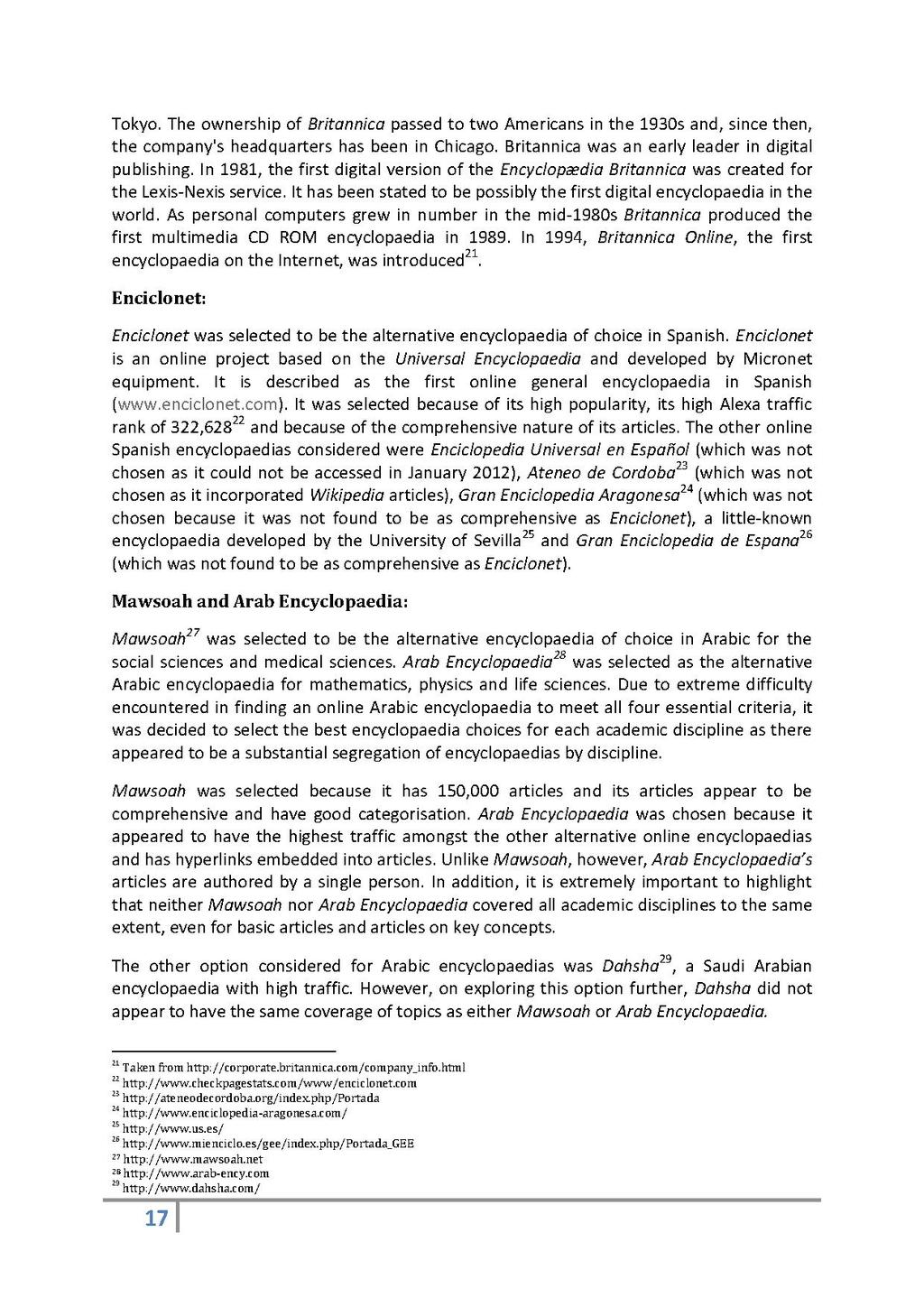Tokyo. The ownership of Britannica passed to two Americans in the 1930s and, since then, the company's headquarters has been in Chicago. Britannica was an early leader in digital publishing. In 1981, the first digital version of the Encyclopædia Britannica was created for the Lexis-Nexis service. It has been stated to be possibly the first digital encyclopaedia in the world. As personal computers grew in number in the mid-1980s Britannica produced the first multimedia CD ROM encyclopaedia in 1989. In 1994, Britannica Online, the first encyclopaedia on the Internet, was introduced[1].
Enciclonet:
Enciclonet was selected to be the alternative encyclopaedia of choice in Spanish. Enciclonet is an online project based on the Universal Encyclopaedia and developed by Micronet equipment. It is described as the first online general encyclopaedia in Spanish (www.enciclonet.com). It was selected because of its high popularity, its high Alexa traffic rank of 322,628[2] and because of the comprehensive nature of its articles. The other online Spanish encyclopaedias considered were Enciclopedia Universal en Español (which was not chosen as it could not be accessed in January 2012), Ateneo de Cordoba[3] (which was not chosen as it incorporated Wikipedia articles), Gran Enciclopedia Aragonesa[4] (which was not chosen because it was not found to be as comprehensive as Enciclonet), a little-known encyclopaedia developed by the University of Sevilla[5] and Gran Enciclopedia de Espana[6] (which was not found to be as comprehensive as Enciclonet).
Mawsoah and Arab Encyclopaedia:
Mawsoah[7] was selected to be the alternative encyclopaedia of choice in Arabic for the social sciences and medical sciences. Arab Encyclopaedia[8] was selected as the alternative Arabic encyclopaedia for mathematics, physics and life sciences. Due to extreme difficulty encountered in finding an online Arabic encyclopaedia to meet all four essential criteria, it was decided to select the best encyclopaedia choices for each academic discipline as there appeared to be a substantial segregation of encyclopaedias by discipline.
Mawsoah was selected because it has 150,000 articles and its articles appear to be comprehensive and have good categorisation. Arab Encyclopaedia was chosen because it appeared to have the highest traffic amongst the other alternative online encyclopaedias and has hyperlinks embedded into articles. Unlike Mawsoah, however, Arab Encyclopaedia's articles are authored by a single person. In addition, it is extremely important to highlight that neither Mawsoah nor Arab Encyclopaedia covered all academic disciplines to the same extent, even for basic articles and articles on key concepts.
The other option considered for Arabic encyclopaedias was Dahsha[9], a Saudi Arabian encyclopaedia with high traffic. However, on exploring this option further, Dahsha did not appear to have the same coverage of topics as either Mawsoah or Arab Encyclopaedia.
- ↑ Taken from http://corporate.britannica.com/company_info.html
- ↑ http://www.checkpagestats.com/www/enciclonet.com
- ↑ http://ateneodecordoba.org/index.php/Portada
- ↑ http://www.enciclopedia-aragonesa.com/
- ↑ http://www.us.es/
- ↑ http://www.mienciclo.es/gee/index.php/Portada_GEE
- ↑ http://www.mawsoah.net
- ↑ http://www.arab-ency.com
- ↑ http://www.dahsha.com/
17
